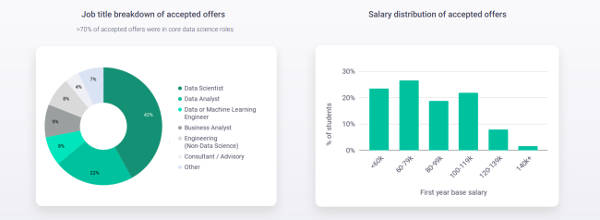By Tech Powered Dad | September 6, 2018
In this post:
- One on One Mentoring
- Springboard Cybersecurity Review
- Springboard UX Design Review
- Do Springboard Students Get Jobs?
- Is Springboard Worth the Money?
- TLDR Data Science Career Track Review

For a little over a year, I’ve worked a couple of hours a week in my evenings with a young company called Springboard, and I’ve become a really big evangelist of the program. The company’s ambition is to help people find new careers in tech fields like data science, digital marketing, and UX design without the full investment of time and money that an additional degree carries. Having worked one on one with a lot of students as they’ve gone through the program and seen the Springboard team in action for a significant period of time, I’ve developed a perspective that I wanted to share here on the blog here in the form of a Springboard review, specifically a review of their Data Science Career Track, while also touching on their Cybersecurity and UX Design Tracks.
Why Choose Springboard?
If we’re going to talk about why someone would choose Springboard to prepare them for a new career, let’s first talk about what Springboard is. Springboard is essentially an online tech bootcamp. Over the course of approximately 6 months, you’ll dive deep into subject matter in a new field with the idea that by the end, you’ll have achieved the skills necessary to attain a new job and apply those skills successfully with your new employer. I think there are a few reasons that the Springboard model is appealing to a lot of people.
Springboard offers three different data science courses. Click here to take their quiz to determine which one is best for you.
Hot Career Fields
First, Springboard is choosing to strike in red hot fields. Just look at the fields I mentioned above. Specifically, Springboard has data science, cybersecurity, and UX design career tracks. These fields are blowing up right now, with demand for workers outpacing supply by a long shot in many job markets. Many people are anxious to jump into this market as quickly as possible and don’t want to go back for another degree. However, they are realistic enough to know they have to develop some strong, entry level skills first to get their first opportunity in a new field.
Online Component
Bootcamps have been around for a while now for web development, and they are popping up for more skills all the time for just the reason I just mentioned. However, they tend to be in specific markets like San Francisco, Chicago, New York, and a few others. Most also require a full-time commitment, meaning no day job for several months. With Springboard, you have more flexibility. You can continue to work your day job and complete Springboard lessons on nights and weekends from the comfort of your living room or whatever location works for you since it is all online. In six months, you can develop a new set of career skills that can land a new job.
Hands-On Mentoring Approach
MOOC programs like the Coursera Data Science Specialization have been around for some time now, and without question, they have a place. I’ve benefited from them myself. But time and time again, the thing I’ve been told from Springboard students that makes their experience different is the one on one interaction that they get with Springboard. Whereas with MOOC programs, you are basically on your own, with Springboard, you have people assigned to work with you throughout the process, guiding you through it every step of the way. The two most important members of your team are your mentor and your career coach.
The mentor is the role that I’ve served in. Every week a Springboard mentee signs onto Skype to meet with their mentor for a call. In some cases, that call can turn into a lifeline. While there are support forums that the student can use during the week to answer questions, the mentor calls are a chance to go even deeper. Do you have questions about an algorithm that is throwing you for a loop? Why won’t GitHub cooperate with our latest commit? What’s a good topic for your capstone project? What kinds of things does your mentor do during their day job? What was it like to go through the data science interview process? Every week you’ve got access to someone who has been doing this work day in and day out for years and can help you through the process. When you look at the list of mentors that work for Springboard, you can’t help but be impressed by their all-star lineup.

The career coach is another aspect of Springboard that adds a lot of value. Springboard really emphasizes the process of finding a job, not just learning skills. The majority of the data science curriculum is devoted to topics like data cleaning, visualizations, data story telling, and machine learning. However, there’s also a lot of time devoted to networking, resume writing, negotiating, and interviewing. The time you spend with your career coach is a chance to take a deep dive on these subjects and let him or her know as you need support on certain aspect. Maybe you’re good at networking, but you have some questions about negotiation. This is where you can get that help.
Springboard Cybersecurity Career Track Review
Equifax. Yahoo. Target. The list of companies that have been affected by massive breaches goes on and on. To some extent, these companies never fully recover their trust with the public. Enterprises are cranking up the spending on security, with Gartner projecting that the spending has reached nearly $100 billion in 2018. This presents an outstanding career opportunity for tech professionals looking to pivot into cybersecurity. In fact, the Bureau of Labor Statistics now reports that the average salary for a cybersecurity professional is $116,000. Springboard’s Cybersecurity program prepares individuals for this in demand career.
I would recommend the Springboard Cybersecurity Career Track for many of the same reasons I would recommend their Data Science Career Track.
- A first class curriculum: Springboard’s Cybersecurity curriculum is broken into 12 challenging but manageable units that culminate in a capstone project that let you show your skills off to a future employer.
- One on one mentoring: As with other Springboard programs you get a mentor designed to work with you individually on a weekly basis to answer your questions and counsel you.
- Career coaching: As crucial as it is to have the cybersecurity skills, it is not enough. You need to know how to get the best job at the best salary. The career coach helps with this.
Click here to learn more about the Springboard UX Design Career track.
Springboard UX Design Career Track Review
One of Springboard’s newest offering’s is its UX Design Career Track. By now, you won’t be surprised to learn that this is yet another tech job with an in-demand skill set. These experts at improving product design from a usability and accessibility perspective are now demanding an average salary of $93,000.
Just as with its other programs I’ve already touched on, Springboard’s program pairs you with an expert mentor to help you through the learning process, a career coach to help you find a job, and allows you to create a final capstone project to showcase your skills. However, in addition to this and a 9-part curriculum that will develop your skills from novice to a UX Designer that’s ready to contribute from day one, there’s one more feature I want to highlight. This program comes with a job guarantee. That means that if you complete the Springboard UX Design Career Track, Springboard will be standing behind their curriculum with a money back guarantee. They can do this because they know that the program does train participants to a high level, but also because the job is in such demand.
Click here to learn more about the Springboard UX Design Career track.
What’s a “Typical” Springboard Data Science Student?
I’m going to transition back to data science for the rest of this review because that’s where I have the most in depth experience with Springboard, but most of what I’m about to say is applicable to the Cybersecurity and UX Design Career tracks as well. Springboard accommodates a wide variety of students across it’s curriculum. With respect to age, gender, experience level, or current career, there is no such thing as a “typical” Springboard student. Some people completing the program are currently working a job while others are between jobs or returning to the workforce after a break. I’ve seen singles in the city balance the program with a busy social life and parents in the suburbs balance it with the challenges of raising kids.
All that said, I have noticed certain student profiles that seem to be cropping up more frequently in my mentee assignments lately:
- Recent College Grads: Students that have just finished a degree but want to supplement their skill set before starting a career in data science.
- Career Switchers: There’s a wide variety of people in this group, from those in academia to business to retail and everything in between.
- Current STEM Workers: Think of those that are already writing code, doing data analysis, or engineering of some sort for whom a move to data science is more of a course correction than a U-turn.
These three groups are not all-encompassing, but they do describe a significant majority of mentees I’ve come in contact with.
Do Springboard Students Really Get Jobs?
The short answer is: yes. Speaking to my own mentees, I’ve seen enough results to know that most of my mentees are advancing their careers, but on different timelines, in different ways. More than once, I have had mentees get hired before finishing their first of the two capstone projects, roughly the midpoint of the program. In some cases, they’ve been hired just as they were concluding the program. Others didn’t find a data science gig until they’d searched for a few months after completing the Springboard bootcamp. Some decided to stay with their current employer and use their new data science skills to advance their opportunities there.
Is Springboard Worth the Money?
Springboard’s pricing is interesting. Compared to a masters’ degree, it’s extremely cheap. Compared to a MOOC, it’s very expensive. Subject to certain restrictions along the lines of finishing the program, applying in certain geographies, etc., Springboard’s Data Science Career Track also offers a money-back guarantee that students will find a job in their new field in 6 months (fine print on the guarantee available here). This gives Springboard significant skin in the game to help its students through the process of finding the job. You can see on Springboard’s site they haven’t had to offer a refund yet. They also give detailed statistics on the types of jobs and salaries that students are accepting.
Springboard Data Science students demonstrate strong success in the job market.
To put the cost of Springboard in perspective, Glassdoor reports that the average data scientist salary is about $140,000. While most people won’t make that amount in their first data science job, data science salaries are very strong, and many companies are giving signing bonuses that are greater than the cost of Springboard, making a decision to go with Springboard a logical one from a dollars and cents perspective.
But set the money question aside for a minute. The more important question is, would you be happier in a data science position than you are doing what you are doing today? Data scientists report high job satisfaction and work-life balance. Cybersecurity professionals say they love being in a field where integrity takes a front seat. UX Designers talk about how much they love being at the forefront of new product development. These jobs have interesting and challenging work. If you think that data science, cybersecurity, or UX design could be a good fit for you, I’m not going to say that is priceless, but it’s definitely worth the cost of investing in yourself.
Bottom Line Springboard Data Science Career Track Review
No question, I’m probably biased by the great experience I’ve had with Springboard, but I’m a big believer in Springboard bootcamps. I’ve only lightly touched on data science curriculum, which is an ever evolving and improving combination of lessons created by Springboard staff, Datacamp tutorials, and capstone projects that students create that give them an opportunity to showcase their skills to potential employers. You also have the chance to specialize in deep learning or natural language processing, which are extremely valuable career skills to a data scientist.
The Springboard curriculum is strong, but there are a lot of data science programs out there with a solid curriculum. The reason to go with Springboard is the one on one attention you get with your mentor, with your career coach that truly makes the experience excellent. When I was making the transition to data science, I had to figure these things out on my own, and it was a struggle. I saw that the vast majority of people in the same situation around me didn’t make it. It’s good to be in a situation where there’s a team that’s got your back. Pairing that team with the convenience of being able to continue to work on the Springboard program at your convenience makes it a great choice.
Click here to learn more about applying to be a student at any of Springboard’s 9 specializations.
Some links on this site are affiliate links, meaning a percentage of your purchase will support my work at Tech Powered Math at no additional cost to you. Thanks for your support!



